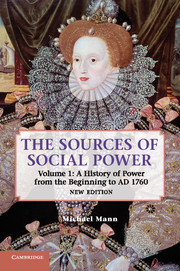Book contents
- Frontmatter
- Contents
- Preface to the new edition
- Preface
- 1 Societies as organized power networks
- 2 The end of general social evolution: how prehistoric peoples evaded power
- 3 The emergence of stratification, states, and multi-power-actor civilization in Mesopotamia
- 4 A comparative analysis of the emergence of stratification, states, and multi-power-actor civilizations
- 5 The first empires of domination: the dialectics of compulsory cooperation
- 6 “Indo-Europeans” and iron: expanding, diversified power networks
- 7 Phoenicians and Greeks: decentralized multi-power-actor civilizations
- 8 Revitalized empires of domination: Assyria and Persia
- 9 The Roman territorial empire
- 10 Ideology transcendent: the Christian ecumene
- 11 A comparative excursus into the world religions: Confucianism, Islam, and (especially) Hindu caste
- 12 The European dynamic: I. The intensive phase, a.d. 800–1155
- 13 The European dynamic: II. The rise of coordinating states, 1155–1477
- 14 The European dynamic: III. International capitalism and organic national states, 1477–1760
- 15 European conclusions: explaining European dynamism – capitalism, Christendom, and states
- 16 Patterns of world-historical development in agrarian societies
- Index
- References
14 - The European dynamic: III. International capitalism and organic national states, 1477–1760
Published online by Cambridge University Press: 05 July 2013
- Frontmatter
- Contents
- Preface to the new edition
- Preface
- 1 Societies as organized power networks
- 2 The end of general social evolution: how prehistoric peoples evaded power
- 3 The emergence of stratification, states, and multi-power-actor civilization in Mesopotamia
- 4 A comparative analysis of the emergence of stratification, states, and multi-power-actor civilizations
- 5 The first empires of domination: the dialectics of compulsory cooperation
- 6 “Indo-Europeans” and iron: expanding, diversified power networks
- 7 Phoenicians and Greeks: decentralized multi-power-actor civilizations
- 8 Revitalized empires of domination: Assyria and Persia
- 9 The Roman territorial empire
- 10 Ideology transcendent: the Christian ecumene
- 11 A comparative excursus into the world religions: Confucianism, Islam, and (especially) Hindu caste
- 12 The European dynamic: I. The intensive phase, a.d. 800–1155
- 13 The European dynamic: II. The rise of coordinating states, 1155–1477
- 14 The European dynamic: III. International capitalism and organic national states, 1477–1760
- 15 European conclusions: explaining European dynamism – capitalism, Christendom, and states
- 16 Patterns of world-historical development in agrarian societies
- Index
- References
Summary
The last two chapters focused on different aspects of European development. Chapter 12 concentrated on the local, intensive feudal dynamic, especially on its economic dynamic. Chapter 13 moved outward (as Europe itself did), focusing on more extensive power relations, especially on the role of the state. Overall, European development was a combination of the two. In the present chapter we see the combination emerge up to the Industrial Revolution. The chapter deals more with extensive than intensive aspects of development, and especially with the role of the state. Therefore, it lacks what perhaps it should ideally possess, a sustained explanaton of the various stages of economic growth toward the Industrial Revolution. A genuine explanation would require both economic theory and a comparative methodology, applied across the various regions and countries of Europe that moved in uneven bursts toward industrialization. England, transforming itself into Great Britain, was the first to industrialize, and Great Britain is discussed here. But answers to the question, Why not Italy, or Flanders, or Spain, or France, or Prussia, or Sweden or Holland? would be a necessary part of the explanation, and they are not discussed here.
This might lead to an excessively British account of the whole process. Britain made it first, but perhaps only just. France and parts of the Low Countries were close behind. Once it became clear across the multistate system that Britain had stumbled on enormous new power resources, it was swiftly copied.
- Type
- Chapter
- Information
- The Sources of Social Power , pp. 450 - 499Publisher: Cambridge University PressPrint publication year: 2012



